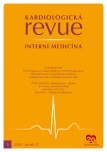-
Medical journals
- Career
PCSK9 inhibitors in clinical practice – update
Authors: Blaha V.; Víšek J.
Authors‘ workplace: III. interní gerontometabolická klinika LF UK a FN Hradec Králové
Published in: Kardiol Rev Int Med 2019, 21(3): 163-167
Overview
PCSK9 inhibitors belong to the new and extremely efficient lipid-lowering agents, which significantly not only decrease low-density lipoprotein (LDL) cholesterol and other aterogenic lipids including lipoprotein (a), but also significantly lower cardiovascular mortality and morbidity. These drugs are human monoclonal antibodies which block the activity of proprotein convertase subtilisin/kexin type 9 (PCSK9 inhibitors). Even though the PCSK9 inhibitors were approved for clinical use in the Czech Republic in autumn 2015, their prescription was only enabled on 1 June 2018. Recently, the first data from the therapy by PCSK9 inhibitors in real clinical praxis has been collected and evaluated. The following case reports of patients with hypercholesterolemia from our out-patient clinic for the lipid disorders document our recent experience with the PCSK9 inhibitor therapy.
Keywords:
Cholesterol – metabolism of LDL cholesterol – subtilisin/ kexin type 9 proprotein convertase
Sources
1. Stone NJ, Robinson JG, Lichtenstein AH et al. 2013 ACC/ AHA guideline on the treatment of blood cholesterol to reduce atherosclerotic cardiovascular risk in adults: a report of the American College of Cardiology/ American Heart Association Task Force on Practice Guidelines. Circulation 2014; 129 (25 Suppl 2): S1 – S45. doi: 10.1161/ 01.cir.0000437738.63853.7a.
2. Gitt AK, Lautsch D, Ferrieres J et al. Low-density lipoprotein cholesterol in a global cohort of 57,885 statin-treated patients. Atherosclerosis 2016; 255 : 200 – 209. doi: 10.1016/ j.atherosclerosis.2016.09.004.
3. Piepoli MF, Hoes AW, Agewall S et al. 2016 European Guidelines on cardiovascular disease prevention in clinical practice: the Sixth Joint Task Force of the European Society of Cardiology and Other Societies on Cardiovascular Disease Prevention in Clinical Practice. Atherosclerosis 2016; 252 : 207 – 274. doi: 10.1016/ j.atherosclerosis.2016.05.037.
4. Catapano AL, Graham I, De Backer G et al. 2016 ESC/ EAS guidelines for the management of dyslipidaemias. Eur Heart J 2016; 37(39): 2999 – 3058. doi: 10.1093/ eurheartj/ ehw272.
5. REPATHA® (evolocumab) prescribing information. Thousand Oaks, CA: Amgen Inc; 2016. Available at: https:/ / www.pi.amgen.com/ ~/ media/ amgen/ repositorysites/ pi-amgen-com/ repatha/ repatha_pi_hcp_english.pdf.
6. PRALUENT® (alirocumab) prescribing information. Bridgewater, NJ: Sanofi-Aventis; 2017. Available at: ttps:/ / www.accessdata.fda.gov/ drugsatfda_docs/ label/ 2017/ 125559s002lbl.pdf
7. Koren MJ, Sabatine MS, Giugliano RP et al. Long-term low-density lipoprotein cholesterol-lowering efficacy, persistence, and safety of evolocumab in treatment of hypercholesterolemia: results up to 4 years from the open-label OSLER-1 extension study. JAMA Cardiol 2017; 2(6): 598 – 607. doi: 10.1001/ jamacardio.2017.0747.
8. Hirayama A, Yamashita S, Ruzza A et al. Long-term treatment with evolocumab among japanese patients – final report of the OSLER open-label extension studies. Circ J 2019; 83(5): 971 – 977. doi: 10.1253/ circj.CJ-19-0139.
9. Sabatine MS, Giugliano RP, Keech AC et al. Evolocumab and clinical outcomes in patients with cardiovascular disease. N Engl J Med 2017; 376(18): 1713 – 1722. doi: 10.1056/ NEJMoa1615664.
10. Schwartz GG, Steg PG, Szarek M et al. Alirocumab and cardiovascular outcomes after acute coronary syndrome. N Engl J Med 2018; 379(22): 2097 – 2107. doi: 10.1056/ NEJMoa1801174.
11. Giugliano RP, Keech A, Murphy SA et al. Clinical efficacy and safety of evolocumab in high-risk patients receiving a statin: secondary analysis of patients with low LDL cholesterol levels and in those already receiving a maximal-potency statin in a randomized clinical trial. JAMA Cardiol 2017; 2(12): 1385 – 1391. doi: 10.1001/ jamacardio.2017.3944.
12. Chamberlain AM, Gong Y, Shaw KM et al. pcsk9 inhibitor use in the real world: data from the National Patient-Centered Research Network. J Am Heart Assoc 2019; 8(9): e011246. doi: 10.1161/ JAHA.118.011246.
13. Razek O, Cermakova L, Armani H et al. Attainment of recommended lipid targets in patients with familial hypercholesterolemia: real-world experience with PCSK9 inhibitors. Can J Cardiol 2018; 34(8): 1004 – 1009. doi: 10.1016/ j.cjca.2018.04.014.
14. Saborowski M, Dölle M, Manns MP et al. Lipid--lowering therapy with PCSK9-inhibitors in the management of cardiovascular high-risk patients: Effectiveness, therapy adherence and safety in a real world cohort. Cardiol J 2018; 25(1): 32 – 41. doi: 10.5603/ CJ.a2017.0137.
Labels
Paediatric cardiology Internal medicine Cardiac surgery Cardiology
Article was published inCardiology Review

2019 Issue 3-
All articles in this issue
- Heart failure and chronic obstructive pulmonary disease
- Pulmonary hypertension and obstructive sleep apnoea syndrome
- Epidemiology of tuberculosis
- Severe community-acquired pneumonia
- Idiopathic pulmonary fibrosis – changes in diagnostics and treatment
- Amiodarone lung toxicity – ‘amiodarone lung’
- Sarcoidosis – current view on pathogenesis, diagnosis and treatment
- Cardiovascular effects of recreational drugs (cocaine, marijuana, methamphetamines)
- PCSK9 inhibitors in clinical practice – update
- HDL-particle subfractions in heart failure
- Evropský a světový kardiologický sjezd – Paříž 2019
- V hlavní roli adherence - Kongres Evropské společnosti pro hypertenzi, Miláno 2019
- Simultánní intervence více rizikových faktorů – cesta k účinnému snížení kardiovaskulárního rizika
- Cardiology Review
- Journal archive
- Current issue
- Online only
- About the journal
Most read in this issue- Cardiovascular effects of recreational drugs (cocaine, marijuana, methamphetamines)
- Sarcoidosis – current view on pathogenesis, diagnosis and treatment
- Epidemiology of tuberculosis
- PCSK9 inhibitors in clinical practice – update
Login#ADS_BOTTOM_SCRIPTS#Forgotten passwordEnter the email address that you registered with. We will send you instructions on how to set a new password.
- Career

